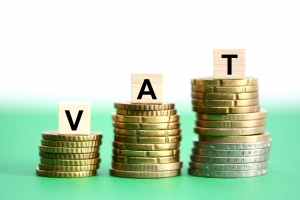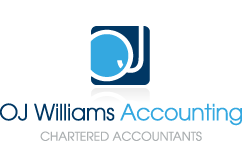VAT
Posted on 23/08/17

When do I have to register for VAT and when is the best time to register for VAT?
You have to register your business if you have VAT taxable turnover of over £85k per year. This is applicable if you operate your business as a sole trader or Limited Company.
Once you register for VAT you have to submit VAT returns every quarter and they are due 5 weeks after the quarter end.
You can appoint your accountant as your VAT agent and they will be able to submit the returns on your behalf.
When is the best time to register for VAT?
However, you can choose to register for VAT before your turnover reaches this level. The decision to register for VAT sooner rather than later is dependent on several factors such as whether your end customers are VAT registered; the type and level of costs you incur and whether you think you will reach the threshold in the short to medium term.
At OJ Williams Accounting we talk through the pros and cons of voluntary registration with you according to your individual business. Not all businesses are the same.
We will ensure you register at the time that is the most beneficial to you.
For example, if the majority of your customers/clients are VAT registered it makes sense to register as soon as possible as adding VAT to your prices will not make any difference to the net costs they are charged and you can then reclaim VAT on your expenses.
However, if your customers/clients are mainly individuals/households who are not registered for VAT, voluntarily registering for VAT will make your prices 20% more expensive and less competitive.
You also need to consider that once you hit the £85,000 threshold you will have to add VAT on to all your invoices and will have to explain this to all your clients.
Ultimately, if you can’t pass on the VAT to existing clients you will end up taking a 20% cut in sales. So, it may be preferable to voluntarily register before you hit the threshold plus you can claim back the VAT on all your expenses.
When I have registered for VAT can I claim VAT on my purchases made before my registration date?
Yes, you can reclaim VAT on goods the business still owns that were purchased four years before registration and services that were purchased six months before registration. For example if you purchased a computer for your business two years ago and then register for VAT you can claim the VAT back on this purchase once you registered for VAT.
If you have bought goods that you have sold on or disposed of prior registration you can’t claim the VAT on these back.
For example, if you have bought promotional material you have given out or stock you have sold you can’t reclaim the VAT.
You can reclaim the VAT on the costs of services such as accountancy fees or software costs that you have incurred within six months or registration.
These rules mean that your first VAT return after registration is very important as you do not want to miss out on claiming back VAT that you are entitled to. You should always get a qualified accountant to help with this return to ensure that you don’t lose out on reclaiming VAT.
What is the difference between cash and invoice VAT accounting?
HMRC allows businesses to choose whether to use cash or invoice VAT accounting.
This simply means that you can either account for VAT in the quarter you issue / receive the invoice or the quarter you receive/pay the cash.
You have to choose which method you wish to use when you register and stick to the same method. Overall it doesn’t affect the total amount of VAT you pay but can affect your short term cashflow. If your customers have long payment terms then the invoice method may mean that you pay the VAT over to HMRC quite some time before you received the cash from the customer.
If you use the invoice scheme and your customer doesn’t end up paying you, you can reclaim the VAT on the bad debt.
Your accountant can talk you through which is the best method for you.
What is flat rate VAT and have the rules changed?
The flat rate VAT is a scheme designed to help simplify VAT returns rather than save money. The flat rate VAT scheme lets a business reduce the amount of VAT it pays on its sales but means businesses can’t reclaim any VAT on its costs. HMRC reduced the benefits of the flat rate scheme for most businesses in April 2017. For more information on flat rate VAT see our blog post.
Do I charge VAT to clients in the EU, EEA and in Non-EU countries?
If you are exporting goods or services to EU countries you do not charge VAT if the end customer is VAT registered itself.
So, for example, if you are selling to a German company who is registered for VAT in Germany you do not include VAT on your invoice. However, you need to obtain your customer’s VAT number and report the sale in your VAT return as there is a separate section for sales to the EU.
If the end customer is not VAT registered then you do need to include VAT on your invoice.
If you receive services from the EU you may have to use the reverse charge mechanism to account for VAT on your VAT return. This does mean you pay any additional VAT but there is a specific way of recording this in your VAT return. Your accountant can explain this to you.
EEA or EEC countries
If you are exporting goods to EEA or EEC countries such as Switzerland or Norway you do not have to charge VAT on your sales invoice.
Non EU countries
If you are invoicing to clients based abroad in non-EU countries such and USA, Mexico, Australia etc. you do not include VAT on your sales invoice.


